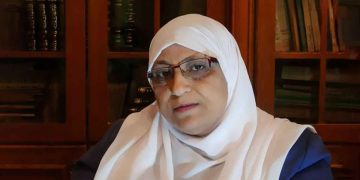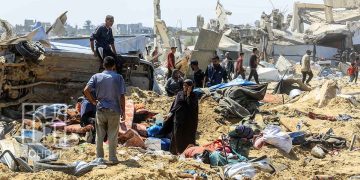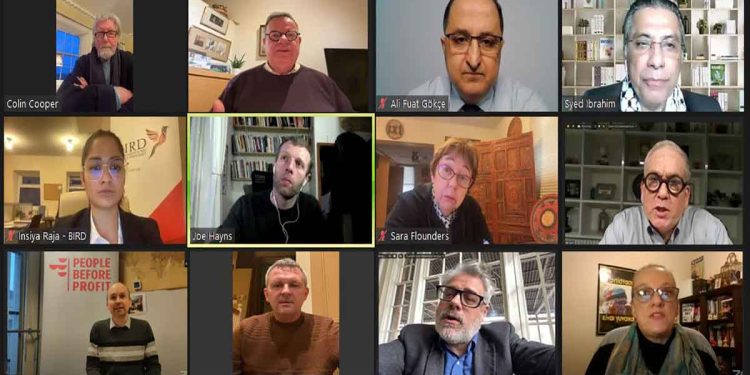Arab Organisation for Human Rights in the UK (AOHR UK) organised a webinar on Thursday, February 8, focusing on the pressing topic, “Gaza Amidst Rafah Closure and UNRWA Aid Cuts.” The event shed light on the severe challenges faced by over 2 million civilians in Gaza due to the closure of the Rafah crossing and recent aid reductions to UNRWA by certain countries. Such measures have inflicted widespread hardship, effectively amounting to collective punishment. Additionally, they worsen the already dire situation, especially in light of the ongoing genocide by Israeli occupation forces.
The webinar featured a panel of esteemed speakers and moderators, including British journalist Joe Hynes and activist Insiya Raja, who led engaging discussions on the complexities of Gaza’s humanitarian crisis and the collaborative measures needed to remedy this dire situation.
The event aimed to unite global voices to examine pressing issues and formulate effective strategies for advocacy and support. Among the distinguished speakers were Prof. Dan Kovalik, an American Professor and Human Rights Lawyer, Dr. Lex Takkenberg, Senior Advisor with Arab Renaissance for Democracy and Development, Alicia Koutsoulieris, Communications Director at Partners for Palestine, Sara Flounders, Co-Director of the International Action Center, Chris Gunness, Former Chief Spokesperson for UNRWA, Syed Ibrahim Syed Noh, Chairman of the Malaysian Parliament Caucus for Palestine, Colin Cooper, Member of Scottish Friends of Palestine, Dr. Ali Fuat Gökçe, Professor of Political Science, Richard Boyd Barrett, Member of the Irish Parliament, and Paul Murphy, Member of the Irish Parliament.
Prof. Dan Kovalik, an American professor and human rights lawyer, spoke on the severe implications of the Rafah crossing closure and the cuts in aid to UNRWA. He emphasised how these actions represented transgressions of international humanitarian law, including violations of the Geneva and Hague Conventions.
Kovalik highlighted the obligations of all parties, including Egypt, Israel, and countries cutting off aid to UNRWA, to protect civilians and ensure their access to necessities such as water, food, and medicine.
He criticised the actions taken in light of the International Court of Justice (ICJ) decision that mandated Israel and, by extension, other nations, to support the basic needs of the Palestinian people. Kovalik underscored the binding nature of the ICJ decision, the Genocide Convention’s requirements, and the dire consequences of discontinuing UNRWA’s services, which are crucial for Palestinians not only in Gaza but also in the West Bank, Lebanon, and Syria.
Prof. Kovalik called for immediate action to reverse the decisions that led to the closure of the Rafah crossing and the cutting off of aid to UNRWA. He urged all involved parties to reconsider their positions in light of international law and moral obligations to prevent further humanitarian crises. Prof. Kovalik advocated for the use of legal and moral arguments to put pressure on the parties to restore aid and ensure the protection of civilians as mandated by international law.
In his speech, Syed Ibrahim Syed Noh, Chairman of the Malaysian Parliament Caucus for Palestine, provided a critical analysis of the current humanitarian crisis in Gaza, emphasising the potential for a situation reminiscent of the Nakba experienced in 1948 but with even more severe consequences. He also emphasised how urgent it is to address the humanitarian catastrophe made worse by the suspension of UNRWA funding, which poses a threat of starvation and famine for Palestinian refugees amid an already dire humanitarian catastrophe.
MP Syed Ibrahim articulated six specific demands aimed at rectifying the situation and ensuring the provision of essential humanitarian assistance to the Palestinian people.
Firstly, he called for countries that had suspended their aid to reconsider and reverse these decisions to prevent further exacerbation of the humanitarian crisis in Gaza.
Secondly, he urged Arab states to utilise their resources, notably oil revenues, to fill the funding gap left by Western countries, supporting UNRWA and the essential services it provides to Palestinian refugees.
Thirdly, the speech advocated for increased international pressure on Israel and its allies to adhere to ICJ rulings and negotiate a ceasefire, emphasising the power of public rallies and the global community’s voice to influence political leaders.
Fourthly, he demanded that the UN Security Council enforce the ICJ ruling through a resolution that could include punitive measures against Israel, such as economic sanctions and travel bans, to ensure compliance with international law.
Fifthly, he called for an end to military support and supplies to Israel from Western and other allies, highlighting that such assistance contributes to acts that could be considered genocide and crimes against humanity.
Finally, he stressed the importance of legal action through the ICC in accordance with ICJ rulings and amplifying the global voice of conscience and humanity to support Palestinian rights and sovereignty.
Sara Flounders’ speech, centred on her trip to Egypt, delved into the critical humanitarian issues facing Gaza and the broader implications of international responses to Israel’s genocidal actions. Flounders highlighted her journey to Cairo as a concerted effort to draw global attention to the dire situation at the Rafah crossing, emphasising the blockade’s role in perpetuating a humanitarian crisis.
Throughout her address, Flounders underscored the collective failure to respond adequately to the ICJ’s rulings, pointing out the paradoxical increase in support for Israel from the Biden administration and its allies despite clear violations of international law. She criticised the global community, especially the United States and European nations, for their unwavering support of Israel, even in the face of genocidal actions towards the Palestinian people.
The trip to Egypt was portrayed as a critical step in her ongoing activism, aimed at breaking the silence and inaction surrounding the blockade of Gaza. Flounders detailed her observations and interactions in Cairo, shedding light on the challenges faced by those attempting to deliver aid through the Rafah crossing. Her experiences in Egypt served to illustrate the broader issue of international complicity and the urgent need for concerted action to address the humanitarian disaster in Gaza.
Flounders called for an immediate end to the blockade and a re-evaluation of international support for Israel, advocating for a global mobilisation against the genocidal treatment of Palestinians. She also called for ending the bombing of Yemen, Iraq, and Syria, emphasising the importance of solidarity, legal action, and public advocacy in combating the deliberate attempt to undermine Palestinian existence and rights.
In his speech, Chris Gunness, former Chief Spokesperson for UNRWA, passionately defended the United Nations Relief and Works Agency against accusations stemming from an Israeli security dossier, which he characterised as an orchestrated piece of news manipulation. Gunness emphasised the critical, life-saving mission of UNRWA, highlighting his deep personal and professional commitment to the values and principles that underpinned the agency’s work.
He added that this move by Israel, followed by rapid defunding actions from the US and UK based on these unverified claims, describing it as a blatant political attack aimed at undermining UNRWA’s mandate and existence.
Gunness underscored the impossibility and inhumanity of abolishing UNRWA, pointing out the catastrophic humanitarian consequences that would follow, particularly highlighting the dire situation in Gaza, where mass starvation represented a “massacre in slow motion.”
Gunness called for an immediate reversal of the decision to suspend aid to UNRWA, urging donors to align with legality and morality. He advocated for a transparent investigation into the allegations and stressed the need for humanitarian decision-making to be insulated from political influences.
Through his defence of UNRWA, Gunness not only rebuked the unfounded Israeli allegations and the political motives behind them but also reaffirmed the agency’s critical role in upholding the rights and dignity of Palestinian refugees amidst the backdrop of acts of genocide.
Dr. Lex Takkenberg, who serves as a Senior Advisor with the Arab Renaissance for Democracy and Development, offered a nuanced perspective on the historical and contemporary challenges faced by the United Nations Relief and Works Agency for Palestine Refugees in the Near East (UNRWA). Drawing on his extensive experience with UNRWA and his role in some NGOs, Takkenberg delved into the agency’s complex relationship with Israel and its significance for Palestinian refugees.
Takkenberg situated the recent criticisms of UNRWA within a historical context, noting that the agency’s interactions with Israel had always been fraught with a mix of dependency and suspicion. Since Egypt and Jordan were in charge of the Gaza Strip and West Bank, respectively, UNRWA operated with little direct interaction with Israel at first. However, this changed after the Six-Day War when Israel explicitly requested UNRWA to continue its operations under Israeli rulling, leading to the Comay-Michelmore Agreement that regulated UNRWA’s assistance to Palestinian refugees in the occupied territories.
Despite Israel’s recognition of the agency’s humanitarian role, Takkenberg pointed out that UNRWA had often been viewed through a lens of scepticism by Israel, partly because the agency’s staff predominantly consisted of Palestinian refugees or nationals from host countries. This perception had led to UNRWA being targeted as a means to deflect criticism from Israel’s actions and policies.
The recent assault on UNRWA, according to Takkenberg, was not coincidental but strategically timed following the ICJ ruling, underscoring a pattern of using the agency as a scapegoat.
Central to Takkenberg’s analysis was the recognition that UNRWA symbolised the unresolved right of return for Palestinian refugees, a right affirmed shortly after the UN General Assembly’s Resolution 194. This symbolic association had made UNRWA a target for right-wing Israeli critics who sought to dismantle the agency as a means of negating the refugees’ rights and aspirations. However, Takkenberg asserted that the elimination of UNRWA would not invalidate the legal and moral claims of Palestinian refugees, nor would it address the underlying issues of displacement and the need for a durable solution.
In conclusion, Dr. Lex Takkenberg emphasised that UNRWA’s existence and work were a testament to the international community’s ongoing responsibility to Palestinian refugees. The agency’s efforts to provide critical services and uphold the rights of millions of displaced individuals stood as a beacon of hope and a reminder of the need for a just resolution to their plight.
Alicia Koutsoulieris, Communications Director at Partners for Palestine, emphasized that the events of October 7th were a response to longstanding oppression faced by Palestinians due to the 17-year blockade in Gaza and over five decades of occupation in the West Bank. She challenged the narrative that an occupying power had the right to defend itself, highlighting that, according to international law, it was the occupied population that held a more legal right to self-defence.
Koutsoulieris pointed out the dire conditions Palestinians lived under, which had been exacerbated since October 7th, with further restrictions on essential aid, electricity, and internet access, describing these actions as inhumane and a form of collective punishment prohibited by international humanitarian law.
Koutsoulieris criticised the Israeli government’s justifications for limiting the amount of food and water allowed into Gaza, ensuring survival but not a life of dignity. Koutsoulieris condemned the cutting off of UNRWA aid, identifying it as a crucial lifeline for Palestinians in Gaza and labelling the act as a component of a slow, tragic genocide. She underscored the role of the United States, as a significant funder of UNRWA, in potentially influencing the situation and advocated for a shift in focus towards stopping the funding of arms to the region, given the documented use of US weapons by Israel in Gaza and the West Bank.
At Partners for Palestine, the focus was on educating the community about the history of the region, international law, and the realities on the ground, challenging the inaccuracies and omissions in Western media coverage. Koutsoulieris called for active citizen engagement with elected officials to ensure the US represented the interests of justice and human rights on the world stage, stressing the power of the electorate to support Palestinian civilians through informed advocacy and voting.
Dr. Ali Fuat Gökçe, Turkish Professor of Political Science, provided a detailed analysis of the situation in Gaza, emphasising the historical context of the ongoing blockade and occupation that had led to severe humanitarian crises. He characterised the events since October 7th as a reaction to long-standing oppression, highlighting the use of terms like “genocide” to describe the killing of civilians and the destruction of Gaza’s cultural, historical, and spiritual heritage.
Gökçe expanded on the geopolitical landscape, discussing the role of the USA in regional security arrangements, normalisation agreements between Gulf countries and Israel, and the broader implications of these developments for global capital and politics. He pointed out the strategic economic and military interests that had influenced the USA’s policies, especially concerning the trade routes and the perceived threats from Iran and its allies.
The professor criticised the international community’s silence on the genocide in Gaza and called for immediate action to ensure a permanent ceasefire, open the Rafah border for aid delivery, and address the humanitarian needs of Gaza’s population. Gökçe emphasised the need for global solidarity, including Muslim organisations and nations, to work together to halt the violence and promote peace. He concluded by urging action to prevent the traumas of today from becoming the violence of tomorrow, advocating for a united effort towards a better future.
Colin Cooper, a medical professional, underscored the indispensable role of UNRWA in providing essential support for Palestinian children’s education and healthcare. Drawing from his expertise in anaesthesia and trauma management, Cooper emphasised the critical need to address the profound and enduring trauma experienced by the children of Gaza. He emphasised that dealing with this trauma would require significant and sustained resources over an extended period.
Additionally, Cooper expressed concern about the potential spread of misinformation through media channels, urging vigilance in discerning accurate information, especially regarding UNRWA’s defunding. He highlighted the importance of critically evaluating media narratives to ensure a comprehensive understanding of the situation in Gaza.
Furthermore, Cooper touched upon the cultural devastation inflicted upon Gaza, noting the destruction of mosques, churches, and other holy sites. He underscored the deliberate erasure of cultural memory by occupying powers and stressed the significance of preserving Palestinian heritage as a vital component of the recovery process.
In conclusion, Cooper urged the audience to prioritise the well-being and prospects of Gaza’s children while also advocating for the preservation of Palestinian culture. He emphasised the importance of collective efforts in addressing these challenges.
In his contribution, Richard Boyd Barrett, a Member of the Irish Parliament, addressed the dire situation in Gaza, describing it as a “genocidal attack by Israel” that has led to the tragic loss of 27,000 Palestinian lives, the displacement of 2 million people, and the imminent threat of famine for the entire population. Barrett condemned the international community, particularly the United States, Britain, Germany, and other European Union countries, for their support of Israel’s apartheid, colonial, and genocidal state actions since 1948. He highlighted the crimes of ethnic cleansing, apartheid, and brutal occupation committed against the Palestinian people.
Barrett pointed out the exacerbation of the crisis with threats of intensified attacks in Rafa, the defunding of UNRWA by Western countries, and the critical role these actions play in worsening the humanitarian disaster. He applauded South Africa’s initiative to bring Israel before the International Court of Justice for genocide, criticising the moral and political credibility of Western governments for their complicity in the ongoing crisis.
Drawing parallels with the struggles against apartheid in South Africa and colonialism in Ireland, Barrett emphasised the importance of global solidarity, resistance, and the imposition of sanctions against Israel. He called for an end to international complicity with the apartheid regime and urged a collective rise against the injustices faced by the people of Gaza and Palestine. Barrett’s speech was a powerful call to action for humanity to unite in support of Gaza and Palestine, demanding immediate and decisive measures to halt the genocide and support the rights and dignity of the Palestinian people.
Paul Murphy, a member of the Irish Parliament, delivered a strong speech condemning Israel’s punitive action against Palestinians in Gaza, particularly highlighting the funding cuts to UNRWA. He asserted that these cuts were a direct response to international scrutiny of Israel’s actions, including accusations of genocide and the case brought before the International Court of Justice by South Africa. Murphy emphasised the dire humanitarian consequences of these funding cuts for the 2 million Palestinians in Gaza who relied on UNRWA aid for their basic needs.
Furthermore, Murphy criticised the complicity of Western powers, particularly the United States, in enabling Israel’s actions through substantial military aid. He called for increased pressure on governments, including Ireland and the EU, to take a stronger stance against Israeli aggression and to support sanctions against Israel. Murphy underscored the importance of rejecting gestures of solidarity with leaders like Joe Biden, who are seen as complicit in supporting Israeli actions.
In light of the upcoming St. Patrick’s Day visit, Murphy advocated for a boycott of Biden’s visit, arguing that it would be inappropriate to extend such gestures of goodwill while Israel continued its atrocities in Gaza. He called for solidarity with the Palestinian people and emphasised the need for a justice-based approach to achieving lasting peace in the region. Murphy urged for the strengthening of the international movement for Palestinian solidarity and called on governments to prioritise justice and human rights in their foreign policies.






























